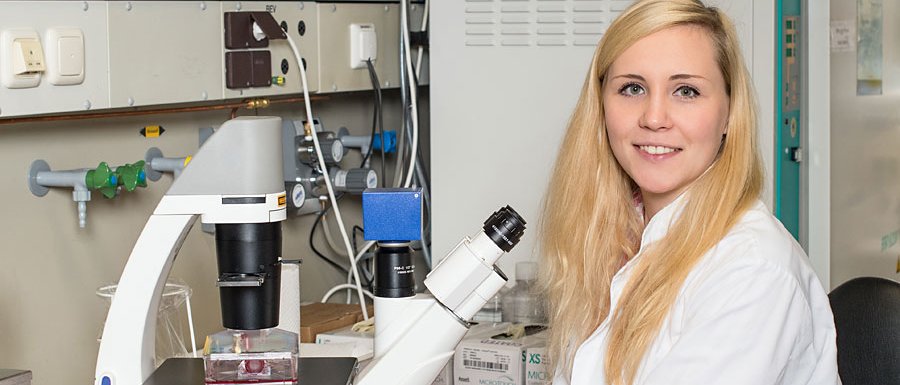Master’s course of Radiation Biology:
More effective measures for cancer treatment

What exactly is Radiation Biology?
Anna Kirstein: The Master’s course of Radiation Biology addresses the topics of radiation protection as well as radiotherapy for the treatment of cancer. It is mainly about possibilities to treat cancer more effectively – and even cure it – with the help of radiotherapy.
What topics does the Master’s program at TUM cover?
The course of studies is interdisciplinary, and it focuses on contents from the fields of Medicine, Biology, and Physics. All the lectures are held in English, and there is a fixed study schedule. Thus, except semester three you cannot make any choices between different modules at the beginning of your studies, as in other courses. In the first and second semester, there are several practical units – and there are two six-week internships in the laboratory during the semester break.
What did you like especially about your Master’s course?
In my opinion, the practical units in the lab were the most fun. Also, there weren’t very many students who started in the same year as I did. We were only about eight to ten students – so the lecturers knew us all so personally, which creates a very different atmosphere from that in the large lecture halls. Our professors have very good contacts, and go to a lot of trouble to take our personal strengths into consideration and to enable us to gain international experience.
How did you come across the Master’s course?
I was enrolled in the Bachelor’s course of Applied Biology, which is about human biology. I was already interested in cancer research back then, so I became aware of the Master’s course in Radiation Biology. TUM, in Munich, is the only European university that offers this course.
What fascinates you about cancer research?
Cancer is a very complex disease. I am very interested in how it develops – and I wanted to understand why it is so hard to treat and cure.
You have just completed your Master’s degree. What are you going to do now?
I took up my doctoral studies at the Klinikum rechts der Isar, where I already worked on my Master’s thesis. I will continue my research, which is about the development and more important treatment of brain tumors, especially glioblastoma. This type of cancer is particularly resistant to radiation. I want to find out why this is the case – and what alternative treatments there might be.
Generally, what are the career opportunities if you graduate in Radiation Biology?
After graduating, you usually take up your doctoral studies and stay in the field of research after that. In Munich, there are three options: at the Klinikum rechts der Isar, which is affiliated to the TUM’s Faculty of Medicine, or the Helmholtz Zentrum in Neuherberg, where the Institute of Radiation Biology and the Institute of Radiation Protection are located, or, as the third option, the Institute for Radiobiology of the Bundeswehr in Neuherberg.
Who can study Radiation Biology?
Anyone who has a Bachelor of Science. It is recommended to have basic knowledge in the fields of Physics and Biology. The students in my year had previously studied Physics, Dentistry, or even Medicine with state examination. You start off with the basic knowledge in almost all of the subject areas, but it is easier if you’ve heard about some of the topics before.
Anna Kirstein (24), who is from Bergisch Gladbach, studied Applied Biology at the Bonn-Rhein-Sieg University of Applied Sciences. Then, she moved to Munich two years ago, in order to study Radiation Biology. Kirstein likes Munich so much that she is planning to stay here after completing her doctoral thesis. In her Master’s course, Anna has made many friends from all over the world: Her fellow students are from India, Iran, Nigeria, and Ghana.
More information:
Radiation Biology Master of Science